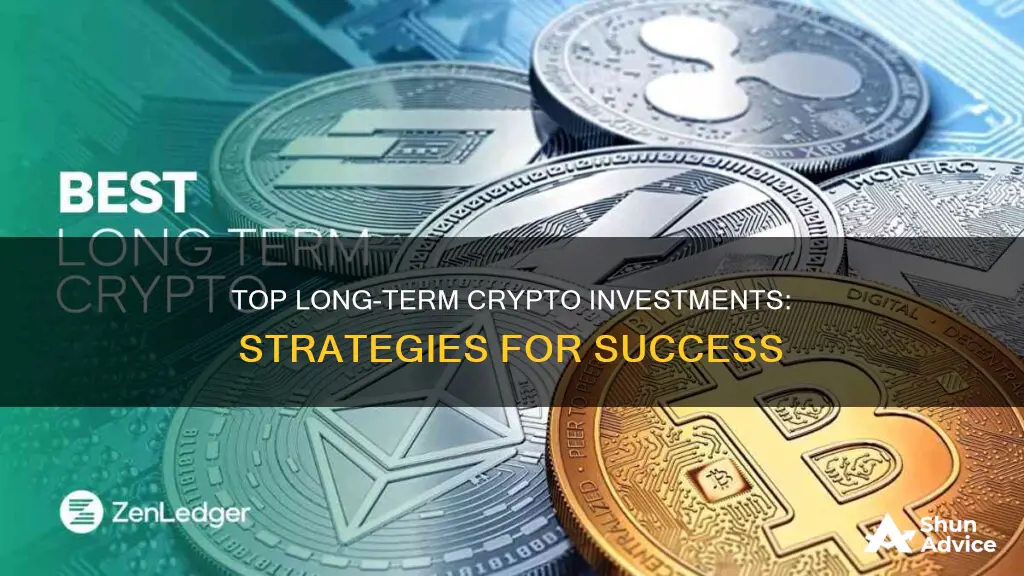
Investing in cryptocurrency is risky business. The market is notoriously volatile, with crypto values fluctuating wildly. However, crypto investments can also see impressive growth in short periods, making them an attractive prospect for those with a high tolerance for risk.
Bitcoin and Ethereum are the two best-established cryptocurrencies. Bitcoin is the oldest and most well-known, with a fixed supply cap of 21 million BTC. It's also the most valuable, with a market cap of over $1 trillion. Ethereum is the second-largest cryptocurrency and the most popular blockchain, with a market cap of $281.9 billion.
Other cryptocurrencies to consider include Binance Coin, Cardano, Polygon, Avalanche, Chainlink, Solana, and Dogecoin. These coins have all shown impressive growth and have unique use cases that make them attractive investment opportunities.
When investing in cryptocurrency, it's important to do your research and understand the risks involved. The crypto market is notoriously unpredictable, and there is always the possibility of losing money. It's also essential to use a secure crypto wallet to store your assets and keep them safe from hackers.
What You'll Learn

Bitcoin: the oldest, most well-known, and trusted cryptocurrency
Bitcoin is the original cryptocurrency, created in 2009 by Satoshi Nakamoto. It is the world's oldest and most well-known cryptocurrency, and it is often referred to as 'digital gold'. As the first cryptocurrency, it is also the most established and has been running successfully for over a decade.
Bitcoin has a fixed supply cap of 21 million, and its scarcity adds to its value. It is also the largest cryptocurrency by market capitalization, with a valuation of about $1.3 trillion in 2024, or roughly 53% of the overall market. Its mainstream acceptance is evidenced by the debut of 11 new Bitcoin exchange-traded funds (ETFs) in January 2024. The approval of spot Bitcoin ETFs has allowed mainstream investors to track Bitcoin's performance without directly owning the digital asset.
Bitcoin's price has skyrocketed as it has become a household name. In May 2016, one bitcoin was worth about $500. As of September 2024, a single bitcoin's price was around $56,902, representing a growth of 11,280%. Its price has continued to rally, and in March 2024, it reached a new all-time high of over $70,000.
Bitcoin's limited supply also makes it an attractive hedge against inflation for investors. The Bitcoin halving event, which occurs roughly every four years, cuts the rewards for mining Bitcoin in half, further contributing to its scarcity.
While other cryptocurrencies have emerged with more advanced features and functionality, Bitcoin's longevity, stability, and widespread adoption make it a trusted and reliable choice for long-term investment. Its fixed supply, mainstream acceptance, and position as the most established cryptocurrency give it a strong foundation for the future.
However, it is important to remember that the crypto market is highly volatile, and investing in Bitcoin carries risks. The value of Bitcoin can fluctuate significantly, and it is subject to the same market forces and external influences as other cryptocurrencies.
Overall, Bitcoin's status as the oldest, most well-known, and trusted cryptocurrency, combined with its limited supply and widespread adoption, make it a popular choice for long-term investment.
Strategic Bitcoin Investment: A Smart Guide
You may want to see also

Ethereum: the biggest blockchain for NFTs and DeFi protocols
Ethereum is a cryptocurrency and blockchain platform that was launched in 2014. It is the second-largest cryptocurrency by market capitalization, after Bitcoin, and the most popular blockchain.
Decentralized Apps and NFTs
Ethereum is the biggest blockchain for decentralized applications and NFTs. It is widely used by developers to create their own cryptocurrency and deploy smart contracts. Many investors see buying ETH as a bet on Web3 and a decentralized internet.
Layer 2 Solutions
Ethereum supports Layer 2 solutions like Optimism and Arbitrum, which offer fast transaction speeds and low fees.
Declining Supply
Since 2022, the Ethereum blockchain has been burning a portion of transaction fees, meaning that its supply decreases over time, which could lead to an increase in price.
Competition
Several blockchains have been created to compete with Ethereum, including Cardano, Solana, and Polkadot. These competitors offer faster transaction speeds, lower fees, and higher staking rewards.
High Fees
Ethereum has been criticized for its high transaction fees, which have driven developers to alternative blockchains.
Long-Term Investment Potential
Ethereum has a unique use case as the biggest blockchain for decentralized apps and NFTs, and its switch to the proof-of-stake system gives it an advantage over Bitcoin in an environmentally conscious world. Its long-term prospects are further strengthened by the SEC's approval of spot ether ETFs, which will make it easier for mainstream investors to track its performance.
However, investors should be aware of the risks associated with investing in Ethereum, including its high fees, competition from other blockchains, and the potential for regulatory issues.
The Ultimate Bitcoin Mining Investment Guide
You may want to see also

Diversification: investing in multiple assets to minimize risk
Investing in cryptocurrencies is risky business. The crypto market is notoriously volatile, and investors need to be prepared for all kinds of scenarios. To minimize risk, most cryptocurrency investors diversify their portfolios into multiple assets.
Grayscale Investments, one of the world's most prominent institutional investors in the blockchain arena, has a portfolio containing many cryptocurrencies, including Bitcoin, Ethereum, Litecoin, Stellar, and XRP, among others. Its digital assets portfolio is primarily occupied by Bitcoin, but owning a mix of BTC and other altcoins is a solid place to start. There are far more people investing large amounts into Bitcoin than into altcoins like Litecoin and XRP. When an altcoin crashes, gains from Bitcoin or other altcoins may save your portfolio's worth. In fact, many altcoin investors move funds into Bitcoin once it starts to rally, pushing Bitcoin even further up while altcoins fall in value.
If you're looking to make a long-term cryptocurrency investment for diversification purposes, you may be more interested in mature coins like Bitcoin and Ethereum, which have longer track records, larger market caps, and more adoption by major financial institutions.
It's important to remember that the crypto market is still relatively young, and that assets can be extremely volatile. Generally, you should never invest more than you can afford to lose.
Crypto Investment Guide: Strategies for Beginners
You may want to see also

Altcoins: investing in cheaper alternatives to Bitcoin
When we first think of crypto, we usually think of Bitcoin. That's because bitcoin represents more than 45% of the total cryptocurrency market. So when we talk about any cryptos outside of bitcoin, all of those cryptos are considered altcoins.
The definition of an altcoin has evolved since the early days of cryptocurrency when anything but bitcoin (BTC) was considered an altcoin. Today, the world of crypto assets is much broader. There is a wide variety of coins and tokens with use cases that go well beyond a medium of exchange, meaning they aren’t necessarily bitcoin competitors.
Still, for lack of a better designation, the basic definition of an altcoin is any crypto asset other than bitcoin.
The motivation for developing these so-called altcoins is often almost always ideological: anyone who develops a Bitcoin alternative believes their own system will work better. Altcoins sometimes offer faster transactions, allow for larger total amounts of coin, or have different mining methods.
Popular Altcoins
Some of the most popular altcoins include:
- Ethereum (ETH)
- Binance Coin (BNB)
- Solana (SOL)
- Tether (USDT)
- XRP (Ripple)
- Dogecoin (DOGE)
- Toncoin (TON)
- Cardano (ADA)
- Avalanche (AVAX)
- Polygon (MATIC)
Libra Cryptocurrency: Worth Investing or Just Another Fad?
You may want to see also

Longevity: investing in cryptos with a long track record
Investing in cryptocurrencies is a risky business. The market is notoriously volatile and unpredictable, and there is no risk-free way to invest. However, some cryptocurrencies have a long track record of returning value, and investing in these can be a good option if you're looking to build wealth over time.
Bitcoin is the world's oldest and most well-known cryptocurrency, and it has been running successfully for over a decade. It has a fixed supply cap of 21 million BTC, and its scarcity gives it value. It is also the most widely accepted cryptocurrency by mainstream investors and major financial institutions.
Ethereum is another cryptocurrency with a long track record. It is the biggest blockchain for decentralised applications and NFTs, and many investors see it as a bet on Web3 and a decentralised internet. Its native token, Ether, has inherent utility as the native token of a popular network.
Other cryptocurrencies with a long track record include Chainlink, Cardano, and Avalanche. Chainlink is a decentralised oracle with unique use cases, such as verifying identity on the blockchain and managing supply chains. Cardano is a proof-of-stake blockchain that was created by one of the co-founders of Ethereum, and it has a hard cap on the number of coins that can exist. Avalanche is a relatively new blockchain that can execute smart contracts, and it is scalable and able to handle large volumes of transactions.
When investing in cryptocurrencies with a long track record, it is important to remember that the market is still relatively young and volatile. It is crucial to do your research and only invest what you can afford to lose.
Reddcoin vs Peercoin: Which is the Better Investment Option?
You may want to see also
Frequently asked questions
Some of the most popular long-term cryptocurrencies to invest in include Bitcoin, Ethereum, Chainlink, Polkadot, Cardano, Avalanche, and Solana.
Investing in cryptocurrencies for the long term can help build wealth over time, requires less active management compared to short-term trading, and offers the potential for high rewards.
The crypto market is notoriously volatile and unpredictable, creating millionaires just as often as it bankrupts investors. It is essential to recognize that there is no risk-free way to invest in cryptocurrencies, and scams are common.







